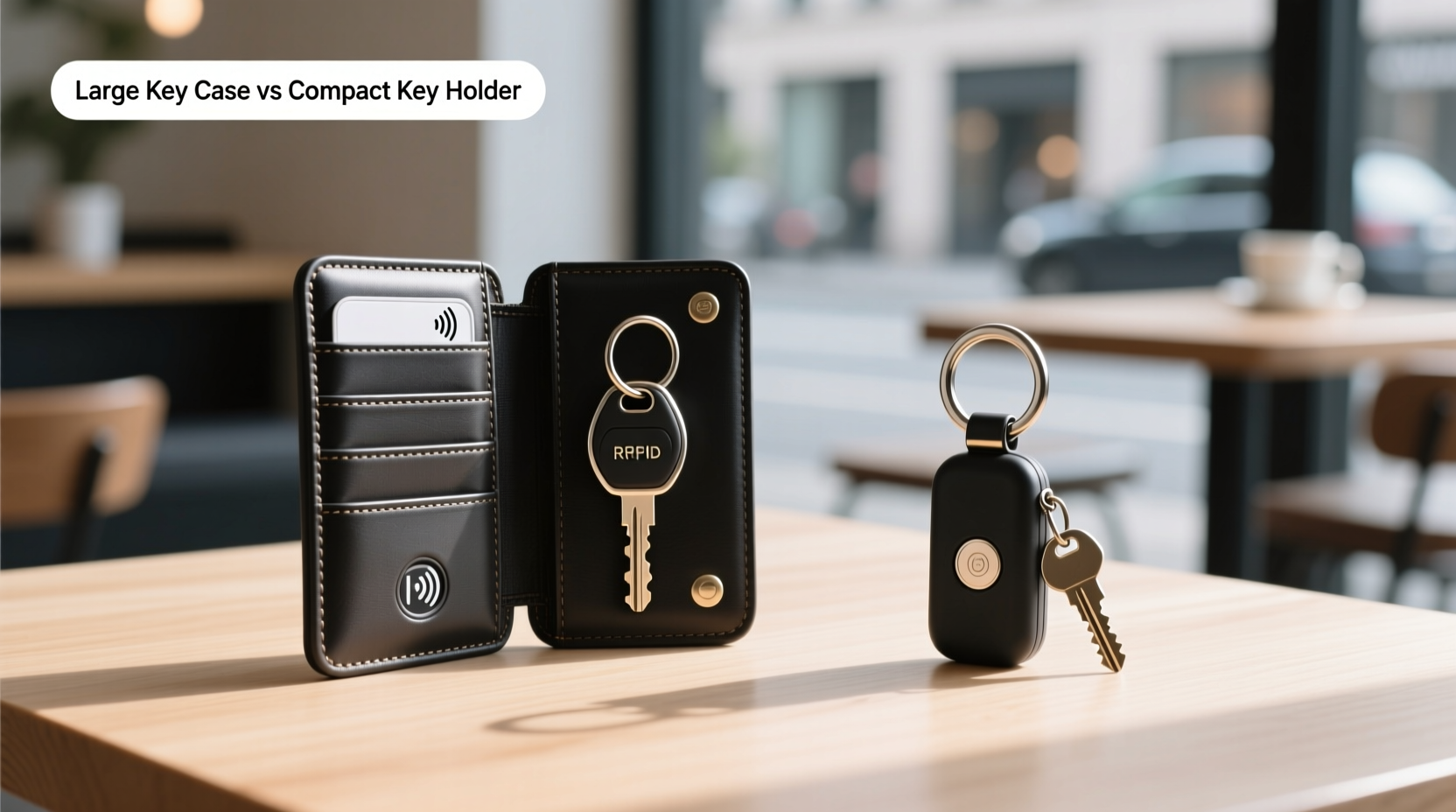Keys are among the most frequently used personal items, yet how we carry them often goes overlooked—until discomfort, lost keys, or frustration sets in. The debate between large key cases and compact key holders isn’t just about size; it reflects deeper preferences in lifestyle, organization, and design philosophy. While some prioritize space and protection, others value minimalism and portability. So, which option wins in real-world use? Based on consumer behavior, ergonomic research, and practical experience, the answer isn't as straightforward as it seems.
The Rise of Key Organization

Gone are the days when everyone tossed loose keys into a pocket or purse. Modern consumers demand smarter solutions—something that protects keys, reduces bulk, and prevents scratches to phones or wallets. This shift has fueled innovation in key organizers, from bulky leather cases with individual slots to sleek metal fobs that consolidate everything into a palm-sized disc.
Today’s market offers two dominant categories: large key cases, which emphasize capacity and structure, and compact key holders, designed for efficiency and minimalism. Each appeals to different user needs, but only one tends to dominate long-term satisfaction.
Large Key Cases: Pros and Practical Limitations
Large key cases typically feature rigid construction, multiple internal compartments, and protective outer shells. They’re marketed toward people with many keys—home, office, garage, car, storage units—or those who want to separate keys by function.
- Capacity: Holds 5–10+ keys with room for small tools or USB drives.
- Protection: Prevents scratching of other items in pockets or bags.
- Organization: Labeled slots help users identify keys quickly.
- Durability: Often made from reinforced plastic, metal, or full-grain leather.
Despite these benefits, large key cases come with significant trade-offs. Their size makes them difficult to fit in tight jeans pockets. Many users report discomfort after prolonged carry, especially when sitting. Additionally, their complexity can backfire—when every key has its own slot, replacing or adding a new one becomes a chore.
Compact Key Holders: Minimalism Meets Functionality
Compact key holders have surged in popularity over the past decade. These streamlined devices—often made from aircraft-grade aluminum or titanium—hold keys in a folded stack, secured with screws or sliding mechanisms. Brands like KeySmart, Cyrcle, and Nomatic have turned this niche product into a lifestyle staple.
The appeal lies in simplicity. Instead of jangling rings or bulky cases, compact holders keep keys flush and silent. Most models fit easily in front or back pockets without digging into the leg. They also eliminate the “key scratch” problem, protecting both the keys and surrounding items.
“Minimalist key holders reduce friction points—literally and figuratively. They solve the noise, bulk, and snag issues that plague traditional keychains.” — Jordan Lee, Industrial Designer & Urban Mobility Consultant
However, not all compact holders are created equal. Poorly designed models can make accessing individual keys difficult, especially in low light. Some require tools to add or remove keys, which defeats the purpose of convenience. And while they save space, they don’t always offer better security—dropping a poorly assembled unit could scatter your keys across a parking lot.
Real-World Usage: Who Prefers What?
A 2023 consumer survey by Urban Gear Review analyzed over 1,200 responses from key organizer users across North America and Europe. The findings reveal clear patterns:
| User Profile | Preferred Option | Reason Cited |
|---|---|---|
| Urban professionals (25–40) | Compact key holder | Pocket comfort, sleek look |
| Tradespeople & contractors | Large key case | Holds tools, durable build |
| Parents with multiple access points | Large key case | Organization for home, school, car |
| Minimalists & travelers | Compact key holder | Lightweight, TSA-friendly |
| Seniors with dexterity issues | Large key case | Easier to grip and organize |
The data shows that preference is highly context-dependent. Lifestyle matters more than marketing claims. For instance, someone living in a city apartment with just house and car keys likely finds a compact holder ideal. But a property manager with dozens of access keys will need the structure and labeling a large case provides.
Mini Case Study: Sarah, Remote Worker & Frequent Traveler
Sarah used to carry a traditional keyring with seven keys—house, office, gym, bike lock, and more. She switched to a large leather key case for “better organization,” but found it too wide for her slim coat pockets. During travel, it took up valuable space in her carry-on.
After reading reviews, she tried a titanium compact key holder. It reduced her key stack by 60% and eliminated pocket bulge. The only downside: she had to label each key with colored tape until she memorized their positions. Within three weeks, she stopped missing the old case entirely.
“It’s not about having fewer keys,” she said. “It’s about making the ones I have less of a burden.”
Choosing the Right Option: A Step-by-Step Guide
Instead of guessing what might work, follow this decision framework to determine your best fit:
- Count your regular-use keys. More than five? Lean toward a large case.
- Assess your carry method. Do you use tight jeans? A compact holder is likely better.
- Test for accessibility. Can you remove one key without taking apart the whole set?
- Consider durability needs. Working in construction or wet environments? Look for waterproof, impact-resistant materials.
- Evaluate aesthetics. Does your key carrier match your everyday carry (EDC) style?
- Try before committing. Borrow a friend’s model or buy from a brand with a return policy.
Frequently Asked Questions
Can compact key holders damage my keys?
High-quality compact holders use precision-machined channels that cradle keys without stress points. Cheap models with sharp edges or overtightening screws may cause wear over time. Always choose reputable brands with rounded interiors and tool-free access.
Are large key cases outdated?
No—but their audience has narrowed. They remain essential for people with complex access needs, such as facility managers or multi-property owners. However, for average users, they’re increasingly seen as unnecessarily bulky.
Do compact key holders really save space?
Yes. Most reduce key volume by 50–70%. A standard keyring might extend 3–4 inches when fanned out; a compact holder keeps the same keys within a 2-inch diameter. This difference is noticeable in tight pockets or small bags.
Final Verdict: What Do People Actually Prefer?
Data and anecdotal evidence point to a clear trend: compact key holders are winning in overall preference. In online reviews, Reddit threads, and retail sales, minimalist designs consistently outperform larger cases in customer satisfaction—especially among younger, urban, and mobile users.
That said, \"preference\" depends on use case. There’s no universal winner. The growing popularity of modular compact systems—where users can add attachments like bottle openers or USB drives—suggests the future lies in adaptable, efficient design rather than sheer capacity.
Checklist: Choosing Your Ideal Key Solution
- ☐ Count how many keys you use daily
- ☐ Determine your primary carry method (pocket, bag, clip)
- ☐ Prioritize either space-saving or organizational features
- ☐ Check material quality and ease of access
- ☐ Read user reviews focused on long-term durability
- ☐ Test the ergonomics in real-life scenarios
Conclusion
The choice between a large key case and a compact key holder ultimately comes down to how you live, move, and manage daily essentials. While compact holders dominate in popularity due to their sleek design and pocket-friendly form, large cases still serve an important role for those with complex access needs. The smartest decision isn’t following trends—it’s aligning your key solution with your actual routine.









 浙公网安备
33010002000092号
浙公网安备
33010002000092号 浙B2-20120091-4
浙B2-20120091-4
Comments
No comments yet. Why don't you start the discussion?